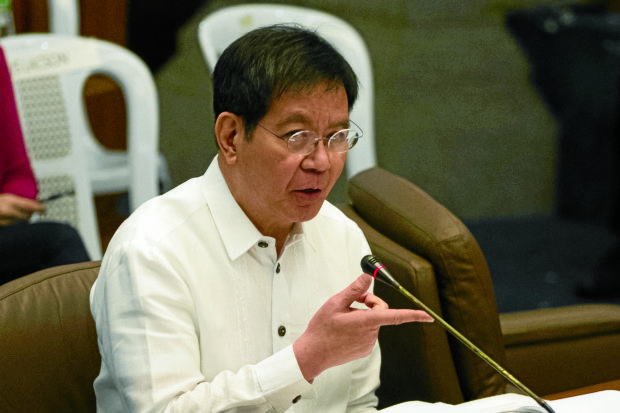Lacson exposes more police scams

Senator Ping Lacson during the Senate Hearing on the murder of Korean National Jee Ick Joo. ALEXIS CORPUZ/INQUIRER PHOTO
Close circuit television footage of a police officer planting “shabu” (crystal meth) in table drawers inside an office was presented by Sen. Panfilo Lacson on Thursday to show that the kidnapping and murder of South Korean Jee Ick-joo was not an isolated case of “tokhang-for-ransom,” or police extortion under cover of President Rodrigo Duterte’s war on illegal drugs.
During a Senate hearing on Jee’s grisly slaying, Lacson cited other similar cases of officers demanding money from people allegedly being pursued in the government’s war on drugs.
Lacson told Philippine National Police Director General Ronald dela Rosa that he did not want to put the PNP on the spot by showing the video “but to impress upon you that this is not an isolated case.”
The chair of the Senate committee on dangerous drugs and public order said the video was given to him by a “very scared” source whose office was raided by policemen on Oct. 26, 2016.
Lacson said that according to his source the planting of shabu was done by a man with a cap and backpack who also robbed the office the equivalent of P7 million before the raid. He said his source also had to “cough up P2 million” following the raid.
Article continues after this advertisementThe former PNP chief said he decided to present the video because there was no case graver than that of Jee as well as “to [put] it on record that this was not isolated and many similar cases are happening.”
Article continues after this advertisementDela Rosa asked Lacson where the supposed police raid happened. Lacson said he would disclose details “in confidence” but added the source would not file any complaint out of fear.
Lacson said the officers who raided the office were from the PNP Special Operations Task Group.
Dela Rosa said the faces of the men in the video were clear and that he would act immediately to investigate the case.
Lacson also said anticrime advocate Teresita Ang See had told him there were 12 other cases of police arresting people for alleged involvement in illegal drugs and demanding money for their release but that the shakedown “did not prosper.”
But he cited the case of a 46-year-old Chinese-Filipino who was kidnapped by eight policemen who demanded money from him in exchange for being cleared of alleged involvement in illegal drugs. The man’s uncle gave P1 million to the policemen, who also were able to get money from his ATM account at a bank on Ongpin Street in Binondo, Manila, Lacson said. Later, he said, the policemen demanded an additional P3 million.
In spite of the payoffs, he said, an illegal drug case was filed against the victim.
Lacson said another man, taken from Muntinlupa and brought to Pasay City by the police last Oct. 24, was also charged even after his family was able to produce P200,000 of the P500,000 demanded.
The man remains in jail.
Lacson said there were other similar cases in Bulacan and Makati.
“These are incidents to show that there are excesses committed by our policemen and if this is not monitored and the PNP doesn’t know about it and no action is taken, then you cannot arrest the situation,” Lacson said.
Lacson urged Dela Rosa to strengthen counterintelligence efforts as he underscored the need for a special unit or composite team to “check on our people.”
The team—which can have 100 members—can come from various PNP units that can conduct counterintelligence and pounce on people committing shenanigans, he said.
Lacson said Ang See did not go to the police to report the cases.
“Trust is something you must earn, it cannot be demanded,” he said. “I hope you know where I am coming from, I love the PNP and I want you to succeed for obvious reasons.”
RELATED VIDEO